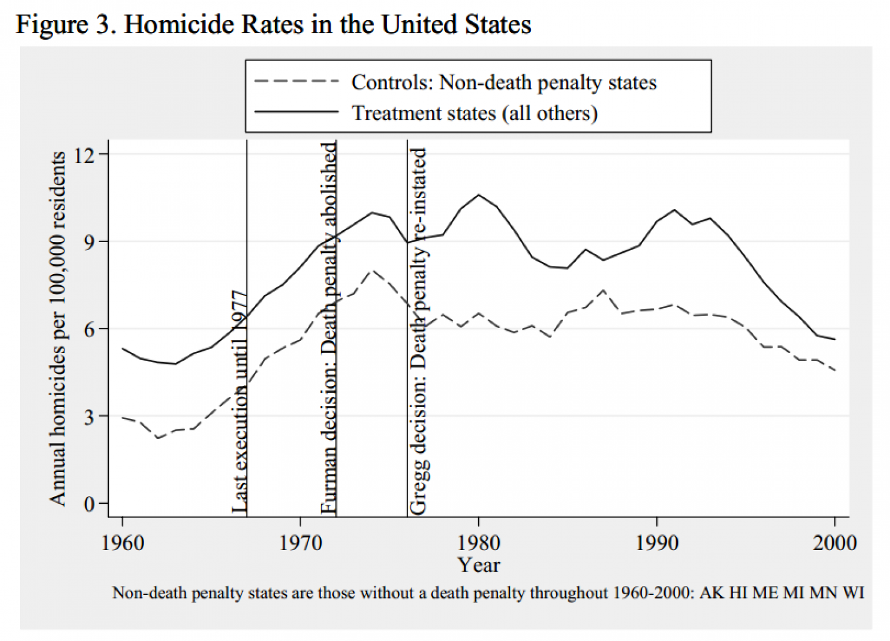I have to admit that up to my mid 20s I used to be a big supporter of the death penalty as a means of punishment for certain crimes. After all, in its simplicity, it seems like a very fair method to serve justice: If someone takes a life, it only seems fair that their life should be taken too. Of course if you take a quick look throughout human history (and capital punishment is as old as humanity itself) you will notice that being killed as a punishment wasn't as hard to happen as it is today. In the name of 'justice', people have been killed for petty crimes, their opposition to authority, even for supporting their religious or political views. That creates a whole bunch of questions about the morality behind capital punishment itself.

(Source) - Hanging, one of the most popular methods of capital punishment throughout human history
But the more you look into the pro-death penalty arguments, the more you realize that all of them are full of flaws and misconceptions. I slowly came to the conclusion that capital punishment was never really a rational, logic-based method to punish and prevent crime, but it was mostly there to create an 'illusion' of retribution, and satisfy human emotions such as anger and need for revenge. In this series of articles I will take some of the main arguments in favor of capital punishment, such as morality, deterrence, retribution, legal costs etc and share my views on them. In this Part 1 of the series I have decided to talk about the effect of the death penalty as a deterrence and whether it really serves to prevent further crimes.

THE STATISTICS OF THE DEATH PENALTY
In 1976, the USA Supreme Court, following the case of Gregg vs Georgia, reaffirmed the acceptance of the death penalty as an option for punishment in the USA. In its decision, the supreme court said that:
‘The death penalty serves two principal social purposes—retribution and deterrence.’
In this first part of my ‘Capital Punishment’ articles, I will share with you my views on the most frequently used argument in favor of Capital Punishment: The Deterrence Effect.
The deterrent effect of capital punishment has been studied extensively since the 1970s but statistics have been contradicting. Isaac Ehrlich was one of the first to publish a major research showing an inverse relationship between the number of executions and the murder rates following the execution. According to his research soon after an execution, the homicide rates appeared to drop. Another research published in 2003 by the Emory University showed similar results. On the other hand though, the absolute numbers when it comes to murder rates in the USA, show that states without the death penalty have consistently lower murder rates than states using executions as a means of punishment. In 2014 for example, states using the death penalty had a murder rate of 4.75 per 100,000 of population whereas states without the death penalty had a murder rate of 3.7. Quite interestingly, states which abolished the death penalty after 2000 such as New Mexico, Maryland and Illinois, still experienced decreases in murder rates. Supporters of capital punishment use studies such as Ehrilich’s to support their cause. The opposition argues that Ehrlich’s research didn’t take into consideration how harder sentences enforced during the last decades and socioeconomic changes affected murder rates and how the decreased number of homicides can be explained by these factors and not the deterrent effect of capital punishment. This can be reinforced by the argument that murder rates during the last couple of decades have decreased in all states irrespective of whether they use capital punishment or not.

(Source) - States with and states without the death penalty show similar decreases in homicide rates. We can therefore conclude that murders have been decreasing regardless of the use of capital punishment or not.
THE THREE BASIC TYPES OF MURDERERS
If we want to leave the statistics behind and make an attempt to form a more theoretical analysis of the deterrence effect of capital punishment we have to take into consideration the motivation of murderers. More than 50% of homicide victims are killed by someone they know. This is especially true for female victims where 40% of them are killed by their husband or boyfriend. More than 40% of murders occur following an argument and about 25% are the result of rape, burglary or robbery. Based on this statistics I will divide murders into three different types and I will try to briefly consider how capital punishment can act as deterrent. But before I do that I need to come to a what I believe to be, a logical conclusion. If the fear of capital punishment as a consequence is to become a deterrence for the potential murderer, he must be able to make a rational decision before he carries out the crime. Capital punishment can only be considered a deterrence if the person about to commit murder has been discouraged and eventually did not commit the crime because of a fear of being executed.

(Source) - Can the fear of this room act as deterrence for a potential murderer?
1. The irrational murderer
Statistics show that most murders fall under the category of ‘crimes of passion’. Whether it is all about revenge, rage, financial differences, jealousy or domestic arguments, it belongs in this group. The murderer in this case is in an emotion driven, aberrant, unsound state of mind which in under no circumstances allows him or her to take a rational, reasonable decision, such as to consider the consequences of his actions. Applying the logical conclusion I mentioned earlier, we can rule out capital punishment acting as a deterrent in this case. A person who is not thinking clearly is simply incapable of taking any reasonable decisions. This temporary state of insanity is actually often used by lawyers to convince the Jury that their client is guilty of second and not first degree murder. Murders committed under the influence of alcohol or drugs can also be put in this category, even though they are not always treated as such by the legal system.
2. The rational murderer
I remember a story about a 16 year old boy who made a chilling 911 phone call after committing not one but multiple homicides. He very calmly called the police, told the dispatcher how he had murdered his two sisters and grandparents and he was sitting on his front porch waiting for the police to arrest him. Even though it can be argued that such a person can never be reasonable, in his mind he took a very rational decision about killing his family, knowing the consequences. The problem here is that he didn’t care about being convicted and possibly executed. Whether the murderer knows the consequences and simply doesn’t care or he believes that the ‘benefit’ of killing someone outweighs the risk of being given the death penalty, capital punishment is again not deterrent in this case either. In this category we can also include the ones who are simply not afraid of the consequence. Take for example a drug dealer. Murder rates among them are considerably higher than any other criminal group. The threat of capital punishment is for him no different than the threat of being murdered during a drug deal and therefore not an additional deterrence. Terrorists can also be included in this category. The fear of execution simply doesn’t apply to them or in most cases, death is what they ultimately seek, since dying will make them ‘martyrs’.
3. The ones who think they won't get caught
In this category we can put the rapists, the robbers, the burglars and everyone else who commits murder during a violent crime. They know the possible punishment for their actions, they are afraid of the consequences but they don’t believe they will apply to them, simply because they think they will outsmart the law enforcement. If you don’t think you will get caught then the consequence can in no way be a deterrence for your action. Statistics show that most criminals committing the crimes mentioned earlier, either tried to run away from the police or hide any potential evidence. This shows that even though they were aware of the consequences of their actions, that didn’t stop them from killing.

MURDERERS ARE NOT DISCOURAGED BY CAPITAL PUNISHMENT
Of course, we can take this a step even further and examine whether deterrence is an effect that we can even apply to the human brain efficiently. Studies which have been done on humans and other animals clearly show that our brains do not respond very well to ‘hypothetical threads’. We are programmed to respond to immediate dangers or refrain from doing acts which have caused a negative experience to us in the past. Even though serial killers usually get most of the media attention, most murders actually only commit the crime once. Therefore, the fear of the death penalty can only be perceived as a hypothetical consequence by the human brain and it is therefore likely to be ignored. Moreover, research shows that humans are more likely to be discouraged from committing a crime if they have already suffered consequences for the same or similar actions. So, one can argue that prison time could theoretically have an equal, if not greater effect than an execution. To add to that, capital punishment doesn’t really seem to be a real thread in most cases, even if you do get caught. The number of executions in the US is tiny compared to the number of murders. Every year more than 10,000 homicides take place in the USA, but there have been less than 1000 executions since 2000. So in the murderer’s mind, the possibility of being executed is highly unlikely. This makes the deterrent effect of capital punishment even smaller.

(Source) - 'The Chair'
I believe that logic and statistics show that the use of death penalty has almost no deterrent effect on crime. Sometimes the modern digital age we live in, creates the illusion that crime is getting worse and this makes most people support harder punishment for criminals. But the truth is that all types of crimes, including murders, rapes and theft are actually decreasing worldwide. Modern media and social networks make it easier for us to hear about crimes and this creates the false belief that out world is becoming a more dangerous place. The truth though is exactly the opposite. Statistics fail to show a relationship between the decreasing crime rates and the use of death penalty. Homicide rates are dropping, in both countries/states which use capital punishment and those who don’t. Research actually states that the efficiency of law enforcement authorities is far more important than the punishment given for a crime. This means that increasing the chances that a criminal will get caught has a much higher deterrent effect than the severity of the punishment for the crime. Deterrence therefore is not a strong argument in favor of capital punishment and methods such as improved law enforcement efficiency, education and improvement of socioeconomic status of people are much better weapons in fighting serious crimes such as murder.
Part 2 of this series will be on the morality of Capital Punishment. So if you liked this article, stay tuned!
==================================================================
Sources:
https://www.washingtonpost.com/news/wonk/wp/2014/04/30/theres-still-no-evidence-that-executions-deter-criminals/ https://www.law.columbia.edu/law_school/communications/reports/summer06/capitalpunish http://link.springer.com/referenceworkentry/10.1007%2F978-1-4614-5690-2_408 http://repository.cmu.edu/cgi/viewcontent.cgi?article=1403&context=heinzworks http://scholarlycommons.law.northwestern.edu/cgi/viewcontent.cgi?article=6335&context=jclc
==================================================================
For more articles like this but also on many other subjects, follow me @nulliusinverba

